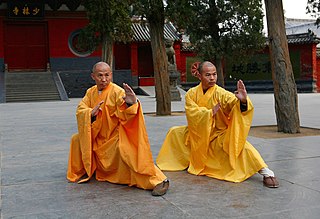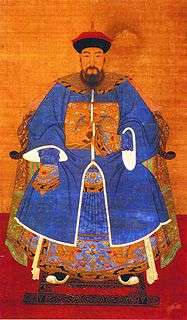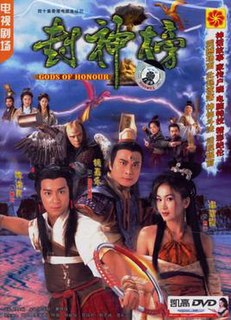Related Research Articles

Li Zicheng, born Li Hongji, also known by the nickname, Dashing King, was a Chinese peasant rebel leader who overthrew the Ming dynasty in 1644 and ruled over northern China briefly as the emperor of the short-lived Shun dynasty before his death a year later.

Hung Ga (洪家), Hung Kuen (洪拳), or Hung Ga Kuen (洪家拳) is a southern Chinese martial art belonging to the southern Shaolin styles. The hallmarks of Hung Ga are strong stances, notably the horse stance, or "si ping ma" (四平馬), and strong hand techniques, notably the bridge hand and the versatile tiger claw. Traditionally, students spent anywhere from several months to three years in stance training, often sitting only in horse stance from half an hour to several hours at a time, before learning any forms. Each form could then take a year or so to learn, with weapons learned last. In current times, this mode of instruction is generally considered impractical for students, who have other concerns beyond practicing kung fu. However, some instructors still follow traditional guidelines and make stance training the majority of their beginner training. Hung Ga is sometimes mischaracterized as solely external—that is, reliant on brute physical force rather than the cultivation of qi—even though the student advances progressively toward an internal focus.

Neo-Confucianism is a moral, ethical, and metaphysical Chinese philosophy influenced by Confucianism, and originated with Han Yu (768–824) and Li Ao (772–841) in the Tang Dynasty, and became prominent during the Song and Ming dynasties under the formulations of Zhu Xi (1130–1200). After the Mongol conquest of China in the thirteenth century, Chinese scholars and officials restored and preserved neo-Confucianism as a way to safeguard the cultural heritage of China.

The Hong Kong New Wave is a film movement in Chinese-language Hong Kong cinema that emerged in the late 1970s and lasted into the early 2000s.

Ge Hong, courtesy name Zhichuan (稚川), was a Chinese linguist, Taoist practitioner, philosopher, physician, politician, and writer during the Eastern Jin dynasty. He was the author of Essays on Chinese Characters, the Baopuzi, the Emergency Formulae at an Elbow's Length, among others. He was the originator of first aid in traditional Chinese medicine and influenced later generations.

The Crimson Charm is a 1971 Hong Kong wuxia film directed by Huang Feng and produced by the Shaw Brothers Studio.

Hong Chengchou (1593–1665), courtesy name Yanyan and art name Hengjiu, was a Chinese official who served under the Ming and Qing dynasties. He was born in present-day Liangshan Village, Yingdu Town, Fujian Province, China. After obtaining the position of a jinshi in the imperial examination in 1616 during the reign of the Wanli Emperor, he joined the civil service of the Ming Empire and served as an official in Shaanxi. During the reign of the Chongzhen Emperor, he was promoted to Minister of War and Viceroy of Suliao. In 1642, he surrendered and defected to the Manchu-led Qing Empire after his defeat at the Battle of Songjin. He became one of the Qing Empire's leading Han Chinese scholar-politicians. While he was in office, he encouraged the Manchu rulers to adopt Han Chinese culture and provided advice to the Qing government on how to consolidate its control over the former territories of the fallen Ming Empire. Apart from Dorgon and Fan Wencheng (范文程), Hong Chengchou was regarded as one of the most influential politicians in the early Qing dynasty. However, he was also villainised by the Han Chinese for his defection to the Qing Empire and for his suppression of the Southern Ming dynasty.
Hong is the pinyin romanization of the Chinese surname 洪 (Hóng). It was listed 184th among the Song-era Hundred Family Surnames. Today it is not among the 100 most common surnames in mainland China but it was the 15th-most-common surname in Taiwan in 2005. As counted by a Chinese census, Taiwan is the area with the largest number of people with the name. It is also the pinyin romanization of a number of less-common names including Hóng, Hóng, and Hóng. All of those names are romanized as Hung in Wade-Giles.

The Caigentan is a circa 1590 text written by the Ming Dynasty scholar and philosopher Hong Zicheng. This compilation of aphorisms eclectically combines elements from the Three teachings, and is comparable with Marcus Aurelius' Meditations or La Rochefoucauld's Maximes.

Gods of Honour is a Hong Kong television series adapted from the 16th-century novel Fengshen Bang, a Chinese vernacular classic written by Xu Zhonglin and Lu Xixing. The series was first aired on TVB Jade in Hong Kong in 2001. It starred Benny Chan, Chin Kar-lok, Irene Wan, Michelle Ye, Dickson Lee, Yuen Wah, Kingdom Yuen and Winnie Yeung in the lead roles.

Hānshān Déqīng (1546–1623), formerly transliterated Han-Shan Te-Ch’ing, was a leading Buddhist monk and poet of Ming Dynasty China who widely propagated the teachings of Chán and Pure Land Buddhism.
The Mouzi Lihuolun is a classic Chinese Buddhist text. It comprises a purportedly autobiographical preface by Master Mou, a late 2nd-century Confucian scholar-official who converted to Buddhism, and an imaginary dialogue of questions and answers about Buddhist practices.

Wufu, meaning the five blessings, is a concept that signify a grouping of certain good fortunes and luck in Chinese culture.
ICAC Investigators 1996 is a 1996 Hong Kong crime television miniseries co-produced by Television Broadcasts Limited and the Independent Commission Against Corruption of Hong Kong, and the eighth installment of the ICAC Investigators series.

Patriotic soup is a vegetable soup originated by Teochew people. It was developed during the final year of China's Song dynasty as an improvisational dish.
Zhu Changxun (1586–1641) was the third son of the Ming dynasty Wanli Emperor. His mother, Noble Consort Zheng, was a favoured concubine and, in efforts to please her, the emperor attempted to have Zhu made heir apparent, but failed to overturn the rule of primogeniture. After the fall of the Ming, however, Zhu's son, Zhu Yousong, became emperor of the Southern Ming.

Lam Cho was the Hung Ga Grandmaster and Dit Da practitioner of the Lam Family Hung Ga lineage. He was noted to be the last martial arts Grandmaster who lived during the times of well-known martial artists Wong Fei-hung and Lam Sai-wing, his adoptive uncle.

The ancient Chinese term fǎn is a basic concept of Daoism. The Daodejing says "Reversal is the movement of the Way ... Being is born from nonbeing." Daoist texts use fan in three interconnected meanings: "return to the root", "cyclical return", and "return to the contrary". In Chinese cosmology, everything in the universe emerges from the primordial Dao, continually transforms, and inevitably returns to it, which parallels the eternal return in philosophy or cyclic model in physical cosmology. Fan is also significant in Chinese alchemy and Daoist meditation.

Witman Hung partygate refers to a political scandal in Hong Kong that occurred during the COVID-19 pandemic. A banquet was held at a tapas bar in Wan Chai on 3 January 2022, during the fifth wave of COVID-19 pandemic, to celebrate the 53rd birthday of Witman Hung Wai-man, a delegate of Hong Kong to the National People's Congress. Amidst initial spread of the Omicron variant, the event was attended by at least 225 people, including fourteen senior officials and twenty lawmakers, exceeding the legal capacity of the venue. The party was held against advice given by authorities to avoid large gatherings, and some attendees were later scrutinised for failing to scan the LeaveHomeSafe contact tracing app, as was legally required.
References
- Aitken, Robert and D.W.Y Kwok (2006). Vegetable Roots Discourse: Wisdom from Ming China on Life and Living: Caigentan. ISBN 1-59376-091-4.
- Chao Tze-Chiang. 2006. Epigrams from the Ming Dynasty. Discourses on Vegetable Roots. Kessinger Publishing.
- Goodrich, L. Arrington and Fang Chaoying. 1976. Dictionary of Ming biography, 1368-1644. Columbia University Press.
- Lo Yuet Keung 劳悦强. 2002. "Cong Caigentan kan moshi de xinling neizhuan 从《菜根譚》看末世的心灵内转 [Viewing End-of-era Spiritual Change in the Caigentan]," Yazhou wenhua 亚洲文化 [Asian Culture], 26:136-153. (in Chinese)
- Röser, Sabine: Die Aphorismensammlung T’sai-ken t’an: Hung Ying-mings Werk als Spiegel seiner Zeit, der Wan-li Ära der späten Ming-Zeit. PhD dissertation Würzburg 1987.
- Vos, Frits. 1993. "The Ts'ai-ken T'an in Japan," in Conflict and Accommodation in Early Modern East Asia, ed. by Leonard Blussé and Harriet Thelma, 169–188. Brill.